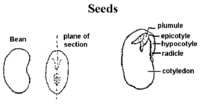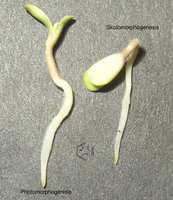Contributed by:
backyardchemist5
Submitted: 08-10-2003
Image archived: 2003

1. All of
the following conditions must be present for seed
germination:
a. Temperature
b. Moisture
c. Oxygen
2. The seed starts absorbing water
by imbibition. Water swells the seed coat and brings the
dormant plant inside the seed back to life.
3.
The testa (seed coat) cracks.
4. The ratticle
emerges from the seed, and forms into the root.
5. The hypocotyl elongates, pushing the 2
cotyledons above ground. As the cotyledons are pushed
above ground, the testa fall off.
6. The plant
uses up energy stored in the endosperm as it produces
leaves and extends its root structure. The cotyledons
(photsynthetic in marijuana) photsynthesize as they
emerge, and continue supplying the seedling with energy
until they undergo abscision and fall off.
Once
the true leaves are formed, photosynthesis becomes the
primary energy source, and growth becomes much more
rapid.
Note: Marijuana seeds are ?dicots?
(termed because they have 2 cotyledons).
[Editor?s note: Temperature can have a dramatic
effect on the rate of germination.]
The
process of etiolation

Etiolated
plants have not yet been exposed to light and grow
(typically) with a 'shepards crook' shape to protect the
cotyledons (or leaves, depending on the case) as they
are pushed through the soil (skotomorphogenesis).
Upon exposure to light, phytochromes within the
leaves/cotelydons trigger the process of
'de-etiolation'. The 'shepards crook' straightens out
(photomorphogenesis) and the plant starts to produce
chlorophyll.